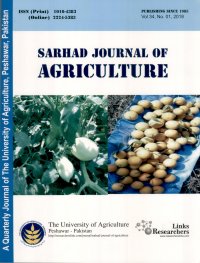Preponderant of Dominant Gene Action in Maize Revealed by Generation Mean Analysis under Natural and Drought Stress Conditions
Preponderant of Dominant Gene Action in Maize Revealed by Generation Mean Analysis under Natural and Drought Stress Conditions
Muhammad Ilyas1, Sardar Ali Khan1, Shahid Iqbal Awan1, Shafiq-ur-Rehman1, Waqar Ahmed1, Muhammad Riaz Khan2, Raja Mohib Muazzam Naz2, Muhammad Mohib Ullah Khan3 and Sumaira Hafeez1*
ABSTRACT
Generation mean analysis belongs to the quantitative biometric methods based on measurement of phenotypic performances of certain quantitative traits on as many as possible plant individuals in basic experimental generations. Initially, 108 inbred lines of maize were planted in two separate trails under water deficit and normal irrigation conditions in the experimental field of Department of Plant Breeding and Molecular Genetics. Selection of parents for further study was done with regards to grain yield and its component traits. Broad range of genetic diversity was shown by the inbred lines and displayed different levels of drought tolerance. Four inbred lines were selected i.e., VDR-51, DR3-126, DR-37 and 5CDR-53. Crosses were attempted between the selected inbred lines. Six generations as P1, P2, F1, F2, BC1 and BC2 were prepared for both the crosses for the estimation of gene action under generation mean analysis and planted in a triplicated Randomized Complete Block Design (RCBD) under split plot arrangement. Most of the traits in both the crosses under natural in addition to drought conditions were controlled by the dominance gene action as indicated by generation mean analysis. Five parameter model (mdhij) indicated that genes which control the grain yield were mostly dominate in nature but also influenced by the epistatic effects of additive genes under natural conditions. These results favoured that the hybrid breeding is the best option in the given set of inbreds to best exploit their potential.
To share on other social networks, click on any share button. What are these?







